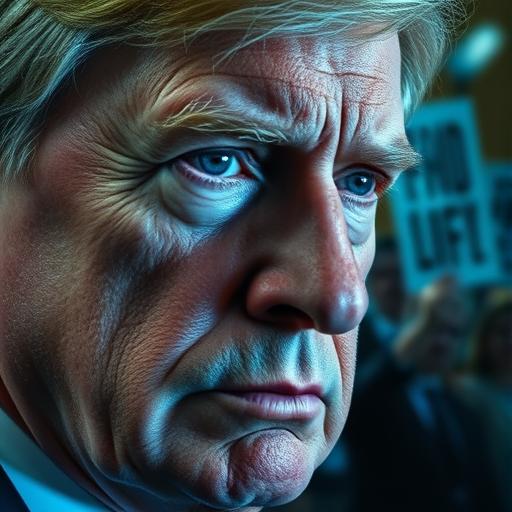Supreme Court Shocks Nation: Presidential Immunity Upends 2024 Race

When Justice Weighs Heavy: The Human Story Behind a Landmark Supreme Court Decision
A Historic Moment in the Marble Halls
On an otherwise unremarkable day in early 2024, the Supreme Court convened with a decision that would shake the very foundations of American politics and law. The courtroom, with its polished marble walls and hushed corridors, housed some of the most formidable minds in the nation. Yet, even in this chamber of intellect and stoicism, the announcement of the 6-3 decision—granting sitting presidents broad immunity from prosecution for official acts—sent ripples far beyond its doors.
Chief Justice John Roberts, known for his calm composure and meticulous articulation, read the majority opinion with a voice betraying no emotion. But those present—clerks, justices, journalists—noticed something unusual. A subtle tension etched across Roberts’ usually impassive face, a slight falter in his tone. It was the burden of a decision that carried consequences few could fully grasp at the moment.
The ruling instantly ignited fiery debates, and in the weeks to come, protests swelled in every corner of the country—from sun-drenched plazas to rain-soaked city streets. People carrying signs demanding accountability, critics decrying the limits placed on justice, supporters celebrating a safeguard for presidential authority—all this underscored the deep divide the Court’s judgment had carved open.
Behind the Gavel: The Weight of Responsibility on Chief Justice Roberts
The Chief Justice’s role is always delicate, balancing law, politics, and morality. But the gravity of this ruling was exceptional. John Roberts understood that by declaring presidential immunity so expansively, he was not merely interpreting the law—he was shaping the future contours of American democracy.
In private conversations with close confidants, Roberts voiced a profound awareness of the decision’s seismic impact. He was haunted by the thought that protecting the presidency from prosecution might inadvertently shield wrongdoing. The justice’s internal conflict reflected the essence of justice itself—a pursuit of fairness within a framework constrained by complex realities.
Roberts’ experience epitomizes the human face of the judiciary. Behind every ruling lies individuals wrestling with principles, consequences, and the long shadow their words will cast through history. His somber demeanor that day was not weakness but a testament to the heavy mantle leadership demands.
The Nation Reacts: Voices from the Streets and Beyond
The ruling did not remain confined to the chambers of the Supreme Court. Overnight, news outlets exploded with coverage, analysts debated endlessly, and citizens took to the streets. The reaction was as diverse as the nation itself.
In Washington, D.C., rain poured relentlessly as thousands gathered, their umbrellas punctuating the gray skies with patches of color. Among them was Maria Lopez, a schoolteacher and mother of two, who described her feelings thus:
“It felt like the ground beneath us was shifting. We believe in accountability for everyone—even the President.”
Across the country, in small-town cafes and urban offices, conversations buzzed with urgency. For many political rivals, the ruling was a blow to justice and transparency; for others, especially some who feared partisan attacks on the executive, it was a reassurance that stability would be maintained.
This moment in history brought to light one undeniable truth—democracy is not a constant, but a living, breathing challenge that calls for vigilant participation from every citizen.
The Power of Principles Under Pressure
At the core of this story is a universal lesson: principles are tested most fiercely when circumstances demand compromise. John Roberts’ decision was based on legal reasoning, precedent, and a vision to protect the presidency as an institution. Yet, it became clear to all that justice is rarely pure. It often inhabits shades of gray, where ideals confront difficult realities.
This scenario reflects a profound truth in life: leadership involves making decisions that may please some and dismay others, but ultimately serve a greater purpose. The capacity to endure criticism and remain grounded in core beliefs defines true strength.
“The ultimate measure of a man is not where he stands in moments of comfort and convenience, but where he stands at times of challenge and controversy.” — Martin Luther King Jr.
Turning Turmoil into Action: What We Can Learn and Do
How to Transform Uncertainty into Empowerment
- Educate Yourself: Dive deep into understanding the judicial system, recent rulings, and their implications beyond headlines.
- Engage Civically: Attend town halls, participate in community discussions, and express your views respectfully.
- Support Accountability: Advocate for transparency through petitions, contacting representatives, or joining watchdog groups.
- Practice Empathy: Recognize the human complexity behind decisions and leadership, promoting dialogue over division.
- Vote Thoughtfully: In upcoming elections, weigh candidates’ values and policies carefully, understanding the long-term impact.
“In the midst of every crisis, lies great opportunity.” — Albert Einstein
Conclusion
The 6-3 Supreme Court decision granting presidents broad immunity is more than a legal ruling. It is a powerful reminder that justice, leadership, and democracy are profoundly human endeavors—fraught with tension, heavy with responsibility, and vulnerable to the times’ pressures. Yet, in acknowledging this complexity, we find our greatest strength: the ability to rise, learn, and act.
Chief Justice Roberts’ solemn delivery, the protesters’ passionate voices, and the nation’s ongoing dialogue all testify to a democracy alive and evolving. This moment challenges us not to despair but to engage more deeply, to hold principles close while embracing imperfect reality. It is a call to courage—the courage to seek truth, demand fairness, and contribute our part in the continuous crafting of justice.
May this story inspire you to stand firm in your convictions, to wield your voice with wisdom, and to remember that every chapter in a nation’s history is written not only by its leaders but by the determined hearts of its people.
